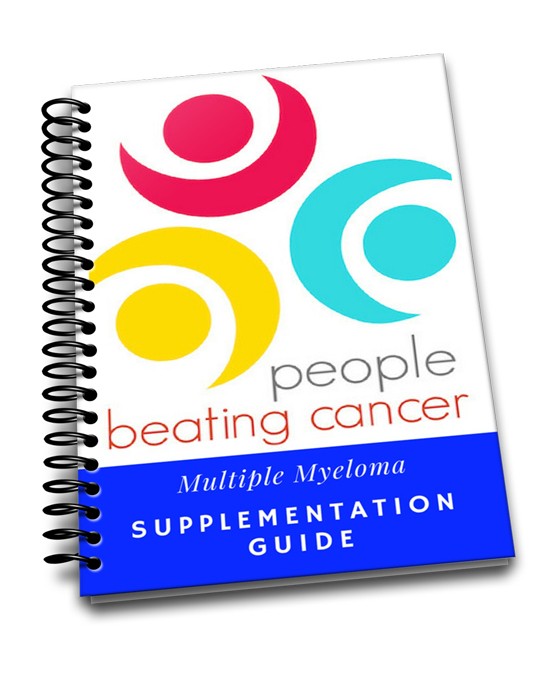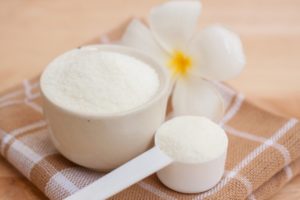Leave a Comment:
17 comments
I wondered what you thought of Curcumin.When I was first diagnosed I went to MD Anderson and saw the doctor that was running trials on taking Curcumin for MM. I asked him what the outcome had been,. He said something like: Although it seemed to help a little, it wasn’t enough for him to recommend it. Then later I went to a Doctor of Nutrition here that specializes in Cancer. I told him about what this doctor had said. He said that the reason it didn’t help more was that your body could only absorb enough to do much good. But a German company had come out with a different formula that the body was able to absorb more readily so he recommended highly that I take that certain formula. I have taken 2 Tablets 3/day, which is a lot and it gets expensive. However since I have been able to manage the MM for 15 years, I am not going to stop now. What do you know about this? Thanks Linda
ReplyHi Linda-
Congrats on managing your MM for the past 15 years. Research does show that curcumin is cytotoxic to monoclonal proteins, and can enhance the efficacy of certain chemo regimens aka it is integrative.
Further, yes, several formulas/brands of curcumin are more bioavailable than others. Regular curcumin is difficult for the body to absorb. The article and graphic linked below (see the triangle- tiny type) linked below explain the issue and list several formulas that are enhanced.
https://pubs.acs.org/doi/10.1021/acsomega.2c07326
David Emerson
ReplyI have been fighting the disease for 15 years. It has gone up and down. I am back on chemo but it isn’t going well. The doctors at first dropped the ball and I didnt get diagnosed until I had 7 compression fractures in my back. I also ended up with type 2 diabetes even though I kept asking them about it. Long story. My question is whether or not my back can get any better and how much does my high blood sugar affect my healing. Another friend my age was just diagnosed with MM so I am trying to help her also. Also a doctor of Nutrition around here has talked to me about a new study showing a kind of mushroom in the Rain Forests that is supposed to be a game changer for us. Ever heard of it?
ReplyHi Linda-
First and foremost Linda, you are doing well to have managed your MM for this long. Especially since you were probably mis-diagnosed before your MM was found. MM is notoriously difficult to identify.
Secondly, research shows that repeated high dose steroids like dexamethasone increases your blood sugar and therefore increases the risk of
type 2 diabetes. I encourage you to either lower the dose of dex. or discontinue it altogether.
As for your back, have you discussed kyphoplasty/vertebroplasty with your Dr.? My understanding is that the only ways to stabilize back pain caused by compression fractures is kyphoplasty or physical therapy to strengthen the muscles.
Re mushrooms and MM, I don’t know if they are game changers but I think the mushroom therapy you are thinking of is
https://peoplebeatingcancer.org/multiple-myeloma-therapy-medical-mushrooms/
David Emerson
Reply[…] Myeloma Therapy- Collagen 101- Skin, Bone, Heart Health […]
Reply[…] Myeloma Therapy- Collagen 101- Skin, Bone, Heart Health- […]
ReplyThank you for the information about collagen. I being try to found out the benefits of Collagen and your explanation was good.. I have Bone problems and want to know if collagen helps. Thanks.
Reply[…] Myeloma Therapy- Collagen 101- Skin, Bone, Heart Health- […]
Reply[…] Myeloma Therapy- Collagen 101- Skin, Bone, Heart Health- […]
ReplyHi MB-
Thanks for asking about MM and collagen. After I read your question earlier, I did some digging around the internet for any info, studies, research, etc. about MM and collagen. The only study I found is linked below.
While the study is difficult to read, what I take from it is that that bone health does suffer in MM patients. We all know this. MM reduces collagen as well as calcium, etc. The study does say that collagen increases in a percentage of MM patients before they relapse. However, I can find no language that points to “collagen helps myeloma cells to grow.”
I will say that I work to keep my bones strong and I will continue to take collagen.
Clinical utility of C-terminal telopeptide of type 1 collagen in multiple myeloma
“Myeloma bone disease (MBD) is a major cause of morbidity in multiple myeloma (MM). We investigated bone turnover markers (BTM) as relapse predictors and biomarkers for monitoring MBD. We measured C-terminal telopeptide of type I collagen (CTX-1), and Procollagen type 1 N Propeptide (P1NP) in 86 MM patients and 26 controls. CTX-1 was higher in newly diagnosed patients compared to control, remission and relapse (P < 0·05), and decreased following treatment.
In the setting of relapse, a CTX-1 rise greater than the calculated least significant change (LSC) was observed in 26% of patients 3-6 months prior to relapse (P = 0·007), and in 60·8% up to 3 months before relapse (P = 0·015).
Statistically significant changes in CTX-1 levels were also observed in patients who were with and without bisphosphonate therapy at the time of relapse. In patients with normal renal function, mean CTX-1 level was highest in the newly diagnosed group (0·771 ± 0·400 μg/l), and lowest in the remission group (0·099 ± 0·070 μg/l) (P < 0·0001). P1NP levels were not statistically different across the patient groups. We conclude that CTX-1, measured on an automated hospital laboratory platform, has a role in routine treatment monitoring and predicting relapse of MBD, even in patients on bisphosphonates.
Reply[…] Collagen 101- Skin, Bone, Heart Health for Myeloma Survivorship […]
Reply[…] Collagen 101- Skin, Bone, Heart Health for Myeloma Survivorship […]
ReplyWhat collagen powder did you use?. Where do you get it?
Most importantly, where is your link to medical evidence?. I have never heard this information before
HI Kathy-
Your questions pushed me to research and write another blog post about collagen citing studies, my brand, my reasoning etc. I am certainly interested in your thinking about the research, and I too, knew litte about collagen.
Collagen-Skin, Muscle, Joint, Brain and Heart Health
Thanks
David Emerson
ReplyAccording to studies, collagen (internal, not on the skin), strengthens skin, bone, muscle, heart and smooths vein walls-
Reply



